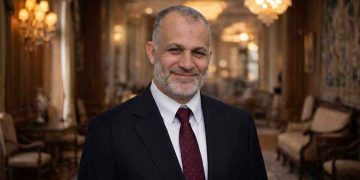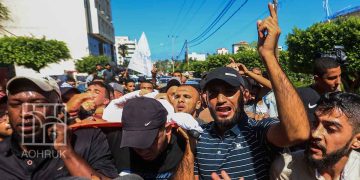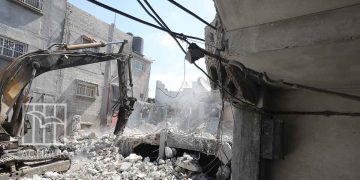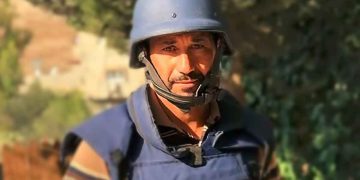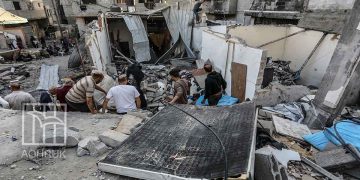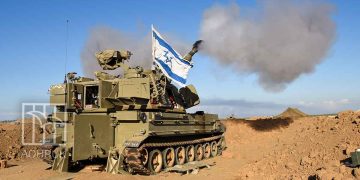The latest Israeli aggression on the Gaza Strip again demonstrated Israeli officials’ total disregard for international law. The recent attack killed 33 Palestinians, including 6 children and 3 women, and resulted in 147 injuries. 51 homes were destroyed, and nearly 1000 were partially damaged.
The silence of the international community means that Israel continues to operate with practical impunity: it is time to hold Israeli leaders accountable for their crimes against Palestinians.
As part of this, Arab Organisation for Human Rights in the UK (AOHR UK) brought together a panel of international experts for a webinar on Israeli impunity.
The speakers were Katie Fallon, Advocacy Manager at Campaign Against Arms Trade (CAAT); Tarek M. Khalil, Education Coordinator at American Muslims for Palestine; Mark Seddon, Director of the Centre for United Nations Studies at the University of Buckingham, UK; Dr. Ramzy Baround, editor of the Palestine Chronicle; Miranda Cleland – Advocacy Officer at Defense for Children Palestine; Zoe Lafferty, a director, theatre-maker, writer and creative producer, and Associate Direction of the Freedom Theatre in the Jenin refugee camp; Ahmed Abofoul, a Legal Research and Advocacy Officer at al-Haq; and Shaina Low, Communication Adviser at the Norwegian Refugee Council (NRC).
Katie Fallon expressed solidarity with the Palestinian people, and voiced concerns about the potential use of UK-manufactured arms in the escalating violence. The violence against Palestinians is “very difficult to think about it, let alone even experience”, she said.
Since 2015, the UK has licensed at least £474 million worth of arms to Israel, and perhaps more that are not known about, given the opaqueness of licensing. These arms range from helicopters to small arms, Ms. Fallon said. At latest some of Israel’s fleet of F-35s were provided by Britain, she added, but “at the moment we can’t track that under these licenses. At present Israel has 36 of these aircraft and they’re due to receive another fourteen in the coming years.”
“CAAT has repeatedly called on the UK government to suspend arms exports to Israel and for an investigation to see if there is a risk that these weapons could be used in the commission of serious violations of international law and humanitarian law”, Ms. Fallon explained. She concluded calling for the UK to end arms sales to Israel and military support for Israeli forces, including training and military alliances.
Tarek Khalil pointed out that Palestinian are currently in the 75th year of al-Nakba, or “the catastrophe” in Arabic, and argued for greater understanding of the collective trauma Palestinians have endured due to ethnic cleansing, dispossession, and fragmentation. Mr. Khalil applauded the resilience and resistance of the Palestinian people, who have maintained their national consciousness and continue to fight for justice and liberation.
Mr. Khalil noted that it become less taboo to label Israel as an apartheid state in the US, citing several human rights groups reports and a number of polls that show younger generations are more sympathetic to Palestinians.
Mr. Khalil stated the importance of recognizing Israel’s roots in Zionism, as a European nationalist ideology which drove the state’s settler-colonial and apartheid project. Israel was founded as a settler-colony, Mr. Khalil argued, and there is a need to see apartheid as an unavoidable outcome of Zionism itself.
Mr. Khalil highlighted the International Criminal Court’s (ICC) recent decision to extend its jurisdiction to the occupied Palestinian territories, thus allowing investigations into Israeli war crimes and crimes against humanity there. He gave his support to the Boycott, Divestment, Sanctions (BDS) initiative as a means to put pressure on Israel.
Speaking next, Mark Seddon, observed that awareness about the al-Nakba in the UK had been growing, against opposition from pro-Israeli forces in British politics.
Mr. Seddon introduced the Palestine Deep Dive project, which connects Palestinian realities to Western audiences. He explained how Israel uses emergency laws based on policies pursued by the British during their mandate in Palestine and insisted on Britain acknowledging its historic responsibility in the region, and in particular the role of the Balfour Declaration. It is important to not shy away from these harsh realities, said Mr. Seddon.
He called on Britain to recognise the state of Palestine and criticized its ongoing trade relations with Israel; he drew attention to the inconsistency between Western powers supporting Ukraine against its occupier while simultaneously arming Israel. But, as Mr. Seddon said, there was a growing consciousness of the Palestinian cause in Britain, one with parallels to the anti-Apartheid struggle.
Dr. Ramzy Baroud noted that despite numerous states and major international institutions recognising the basic plight of Palestinians, little is being done to hold Israel accountable for its actions.
Dr. Baroud highlighted the fact that Palestine was admitted into the International Criminal Court (ICC) in 2009 following the murderous Operation Cast Lead, but that the court has brought no substantial change since then. Dr. Baround argued that the problem is not any lack of knowledge, but rather a political will to take appropriate action; he expressed skepticism toward the ICC’s commitment to investigating Israeli war crimes in Palestine, stating that the budget allocation for such investigations remains low. He contrasted this with the ICC’s swift response to the alleged war crimes committed by Russian President Vladimir Putin.
Zoe Lafferty explained her role at the Freedom Theatre, which was founded in the wake of an Israeli attack against the Jenin refugee camp which killed 52 people.
The theatre was co-founded by Zakaria Zubeidi, a leader of the Al-Aqsa Martyrs Brigade and by actor-director Juliano Mer Khamis. Their mission was to empower young Palestinians to express their reality through art. The theater was more than just a place of cultural resistance; it was a beacon of hope. Despite constant threats and arrests, and the murder of Juliano Khamis, the theater has remained resolute.
Ms. Lafferty emphasised the power of art in challenging the global silence surrounding the Israeli occupation and apartheid. She spoke about the work of poet Dareen Tatour, who was imprisoned for her poem ‘Resist, My People, Resist Them’, and photographer Mohammed Al-Azza, who was shot in the head while documenting the violence in the occupied West Bank.
She also spoke about her play ‘The Revolution’s Promise’, born out of countless interviews with artists across Palestine. Despite the difficulties presented by denials of visas, travel bans, and Israel’s punitive checkpoint system, the artists were determined not to be silent, Ms. Lafferty said.
Ahmed Abofoul, an international lawyer and Legal Research and Advocacy Officer at the Al-Haq Organisation, highlighted the denial of Palestinians’ right to self-determination by Israel. Palestinians have been strategically fragmented Palestinians into four distinct categories, he said.
Mr. Abofoul explained that there are now Palestinians with Israeli citizenship who live as second-class citizens within Israel; Palestinians in Jerusalem (or al-Quds) with precarious residency status; Palestinians in the occupied West Bank and the Gaza Strip, who have been living under military rule for over 55 years; and, Palestinian refugees worldwide who are denied the right to return.
Mr. Abofoul critically examined the blockade of the Gaza Strip, calling it an “open-air prison” in which Israel controls every aspect of Palestinian life. He also criticized how various restrictions, including checkpoints, severely impact Palestinians’ freedom of movement.
He also expressed concern with the Israeli judicial system, its legislation, and military procedures, arguing that they together facilitate the oppression of Palestinians. Mr. Abofoul cited practices including arbitrary detention, excessive use of force, torture, and collective punishment being routinely used against Palestinians.
The legal expert argued that the ICC should expedite its investigation into Israel’s possible crimes. He finished his speech by quoting Benjamin Ferencz, a late international advocate for justice and one of the last Nuremberg prosecutors, “there can be no peace without justice and no justice without law”.
Last to speak, Shaina Low, shed further light on the increasing humanitarian concerns in Palestine.
The leading international humanitarian organization, the Norwegian Refugee Council, aims to provide assistance and protection for Palestinians affected by or threatened with displacement in Gaza and the West Bank. “Our operations are rooted in respect for human rights and the responsibility for all actors to uphold international humanitarian law”, said Ms Low.
It least 152 Palestinians, including 36 children, were killed in the occupied West Bank in the past year, being the deadliest since 2005, she said. Ms. Low added that this trend of violence has continued in 2023, with 99 Palestinians, including 18 children, killed in the West Bank in its first four months.
Both attacks by illegal settlers on Palestinians and home demolitions have also increased over the last period. The international community is “failing to prevent demolitions and resulting forcible transfers”, Ms. Low said. She concluded by urging the international community to hold Israeli authorities accountable.
Arab Organisation for Human Rights in the UK thanks all of the evening’s speakers and all attendees, and hereby renews its call for a just, rights-based solution to the plight of the Palestinians.

